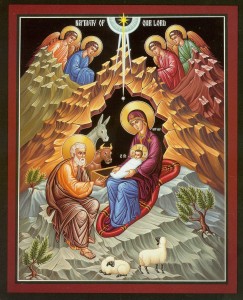
Adorn yourself, O cavern!
Make ready, O manger!
O shepherds and wise men,
bring your gifts
and bear witness,
for the Virgin is coming,
bearing Christ in her womb!
Vespers Hymn of St Nicholas Day
Advent, 2011
For millenia past counting, humanity has experienced both a fascination and a dread of caverns and caves. Caverns can be awesome and beautiful; caves may be narrow and constricting, or broad and expansive. Our earliest ancestors found shelter within them, and a place of defense against weather, wild animals, and human foes. Other ancestors entered caverns for shamanic rituals, and painted their walls with the creatures who both sustained and frightened them.
In the Holy Scriptures, caves are the hiding places for warriors and prophets. They are also places of revelation—Elijah hears the Voice of God in a cave, and later discovers that the Voice is most truly heard in the silence of the heart. In the Psalms, David finds caves to be a place of prayer, penitence, and forgiveness. Even the Arc of the Covenant and the altar of incense, in flight from the destruction of the first temple, find refuge in a cave. And over and over, from Abraham to Judith to Lazarus, caves are the place of burial, symbolizing the words we hear at our own burial: “Remember that thou art dust, and to dust thou shall return.”
Is it any wonder, then, that the early Christians identified the place of our Lord Jesus Christ’s birth as a cave? Truly, it was a refuge from the perils of travel, and the crowds filling the streets of Bethlehem. This humble cavern sheltered the prayers of Mary and Joseph, shone with the adoration of shepherds, received the Magi and their gifts, and rang out with the angels’ songs of great joy.
Assuredly, this lowly cave became the Holy Dwelling of revelation—the revelation that God has come among us, clothed in human flesh; it is also a foreshadowing of Jesus’ return to a cave for His own burial, the same cave that would bear witness to His Resurrection.
May this season of Christ’s birth remind us all to pray for and serve those who also seek refuge in the night, protection from all danger, and a Holy Dwelling—be it ever so humble—in which they too may receive the gift of God’s love, and learn to sing with the angels.
The Rev’d. Susan Creighton